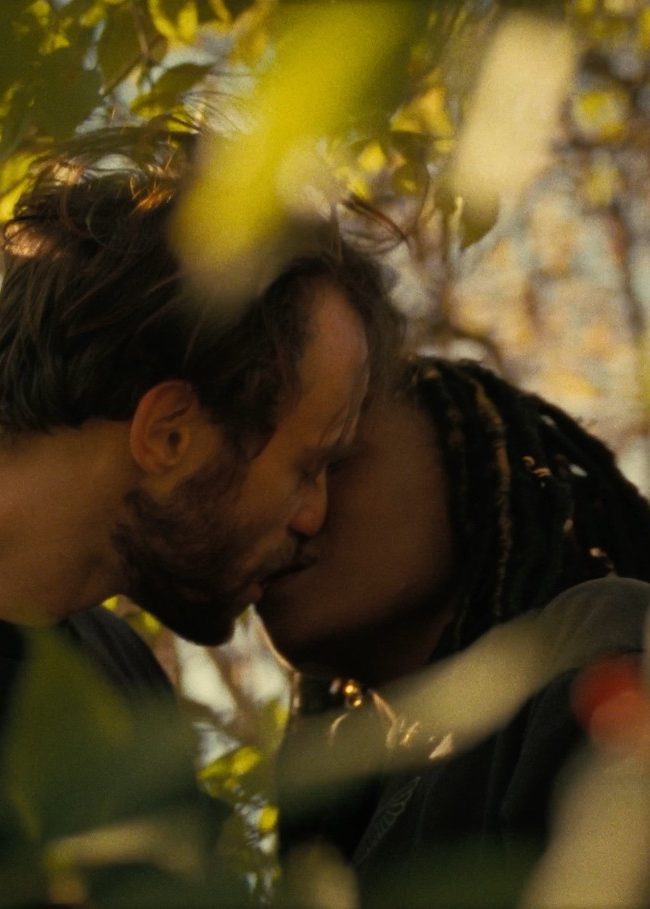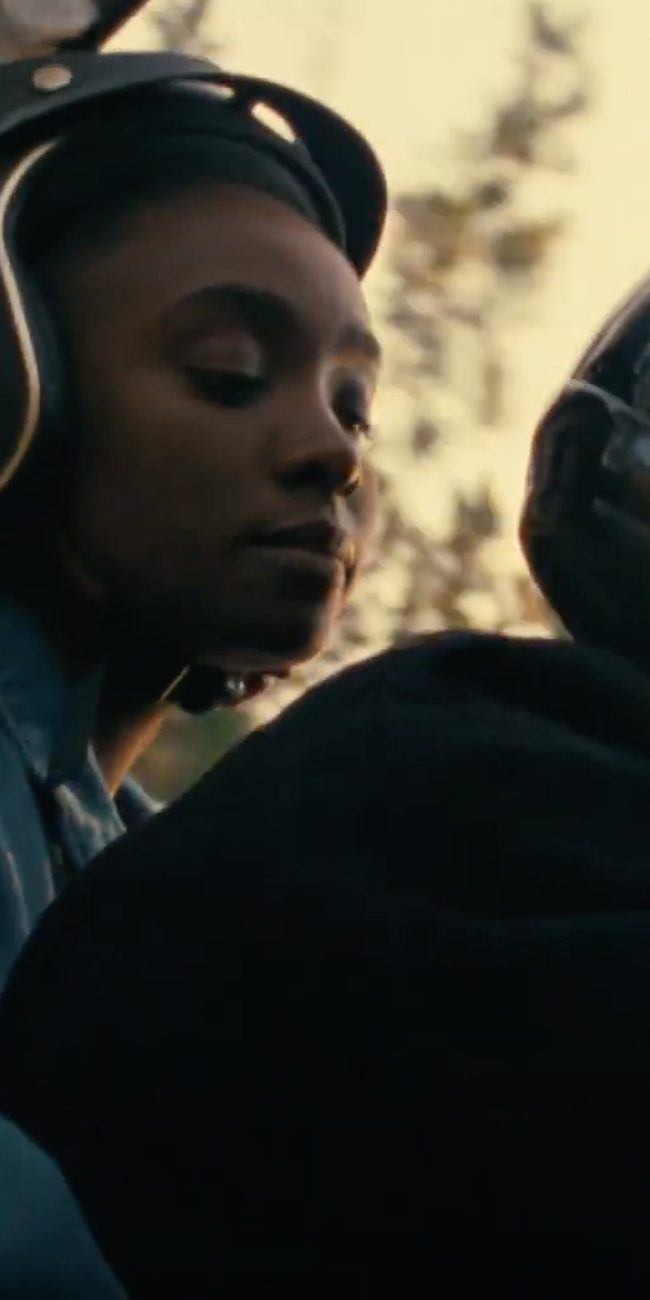A Conversation with Nicole Riegel & Jessica Barden (HOLLER)
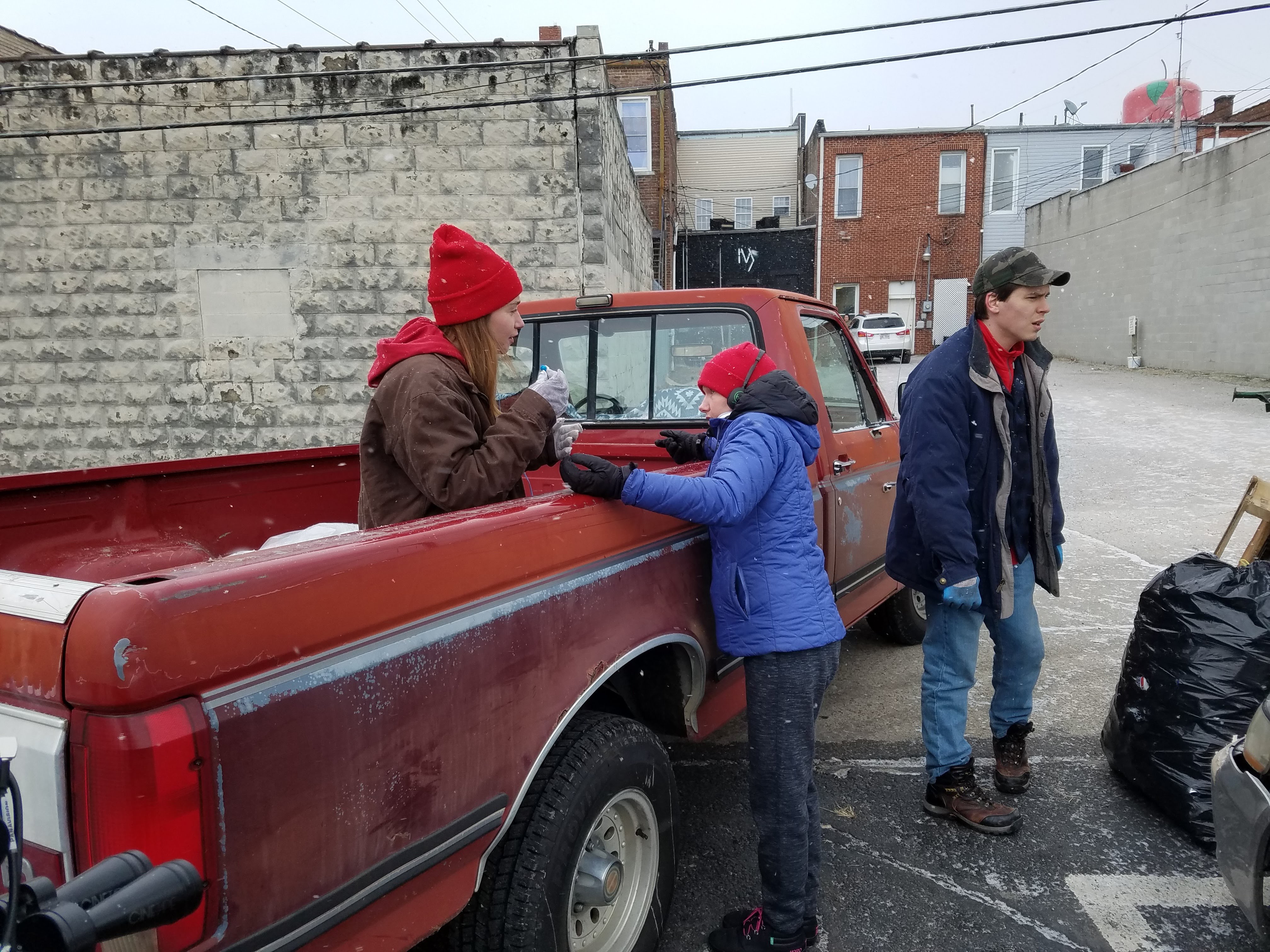
Just before the 2020 Toronto International Film Festival began, I spoke by phone with writer/director Nicole Riegel and lead actress Jessica Barden about their collaboration on the new drama Holler (which I also reviewed). The film tells the semiautobiographical story of Riegel’s working-class roots in Ohio, just before she left for college, with Barden standing in for the director. An adaptation of her 2016 eponymous short, Holler also marks Riegel’s feature debut. In the movie, we focus on the narrative of Ruth (Barden) as she struggles to make ends meet, with her mother in prison and her older brother, Blaze, not quite able to provide enough for them both. When the two siblings decide to go into business with a local scrap-metal scavenger, Hark, what initially seems like a good idea soon turns sour. But what other options are there, for folks like them? Here is a condensed digest of our conversation, edited for length and clarity.
Hammer to Nail: I have not yet had a chance to watch the short that this is adapted from. Can you tell me a little bit about it and what the process of adapting it was like?
Nicole Riegel: It’s so different than the feature. And just in the process of developing the feature and making the feature, it became obvious so soon that it was going to be its own thing and it wasn’t really going to be related to the short and that it was just going to be something different about this young woman and her story. They shared the same title because I always thought that I would base something on this short. And I did film it in a scrapyard. It’s a very different storyline, but it was sort of like a practice run of how to film in a scrapyard around all of these tools, and metal, and the safety precautions to take and just how to operate with a crew in this environment. But I mean, that’s really it, as far as the similarities go.
HtN: So are both the short and the feature, in their own way, semiautobiographical?
NR: Only the feature. And I think that’s where there’s a huge difference between them. I just wanted to make something that was deeply personal and not just an exercise, filming in a certain location. There’s nothing really autobiographical at all in the short film, but the feature is very semiautobiographical. The only thing that’s not true in the feature is my having worked in scrapyards, the way that Ruth does. I grew up around them and that was definitely something that friends and family members worked in and knew a lot about. And a lot of young men who I went to high school with are still involved in the scrap-metal trade. But outside of that, it’s very, very semiautobiographical in something like the scene when the teacher tells Ruth that she may not go to college and encourages her to go to IT [information technology]; that scene happened to me.
Jessica Barden: It also happened to me.
NR: And as I tell that story to more people, lots of young women, like Jessica, tell me that happened to them, too. And I’m just left thinking how many young girls are discouraged by these people who were supposed to encourage them?
HtN: Yeah. And I imagine that it’s not just young girls. In the class-based system that we have, a teacher would probably direct that comment to a lot of people they don’t think should go to college, unfortunately, perhaps thinking they’re being helpful. That’s really unfortunate, and I’m sorry that that happened to the both of you.
JB: (laughs) We’re here now!
HtN: Yeah! (laughs) You’re here now. So, Nicole, speaking of Jessica, how did you cast her in this film? She’s not from Ohio. In fact, she’s from England. Please talk about that.
NR: Well, something occurred to me recently in casting English actors. I feel like English films are more likely to tackle the working class. And you have Ken Loach…
HtN: Indeed, I was about to mention Ken Loach!
NR: Yeah! In Britain, filmmakers are more aggressive in filming the working class. And it’s embraced there in a way where you don’t just have to show a glamorous lifestyle, like we tend to do in American cinema. In British cinema, they have a long history of embracing working-class stories. And I think that also leaks into the kind of actors that British actors are. I think it’s a true art form for them. And so in casting, whether it was an American actor or a British actor, I just wanted someone who felt like Ruth, and Jessica was that. And I think the things that she faces, in her character phases in the film, aren’t always specific to a country. I think there are young women all over the world experiencing things even far worse than she is.
So, I received a call about Jessica. I had not yet seen The End of the F***ing World at that point, and I had lunch with her and she felt like Ruth. And she informed some changes in the character after I met her. And then she was the first audition out of hundreds of girls all over the world. And she had the part as soon as she left the room. It was the first audition of the day, and I just knew; it was incredible. And then she sent me a film called Ellen that she was in, this Channel 4 film. And I just sort of called off the auditions after that. Like her performance in Ellen is so good. And then we continued to work in this as partners for years. It took years to make this film. And Jessica hung in there with me; many elements shifted over the years in trying to get the film made, but Jessica stuck with it. And then she really immersed herself in the process of making the film, the world, the scrapyards, and she can really speak to that much better than I can.
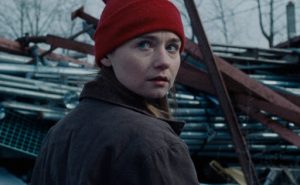
Jessica Barden in “Holler”
JB: So, I was sent the script, I read it and I really recognized the character. I could see that it was a working-class role, which is something that you don’t really get sent a lot. I could completely relate to many things in the movie. Like mainly just the whole feeling of being the first person in your family, or in your community, in your town to be like, “Oh, no, I think I’m different. And I think that I want to do something with my life. I want to go and experience life in a different way.” And that’s a role that I’ve wanted to play for a really long time and the script had it. So I just completely fell in love with it. I then met Nicole and one of the first things that she said to me in the meeting was, “This is going to be a completely different role. You’re going to have to work so hard for me. No director is going to work you as hard as I’m going to work you.”
I was like, “Wow, okay. This is a challenge, but I’m never one to back away from it.” How can you resist somebody saying to you, “This is going to be the hardest thing that you’ve done. I’m going to work you really hard”? Of course, you’re going to want to do it! So yeah, I just was obsessed with it, and I wanted to do everything to get the role. And I can remember in the audition that I did, I really loved it, and love the notes that she was giving me, and the details she was telling me to focus on, and I think we did one improvised.
My adrenaline was crazy when I left it. And I was like, “I need to do everything to get this film. I don’t care. This is what I want to do.” And from the moment that I got the role, I just wanted to represent this person. Actually, because I do feel like in England there are a lot of iconic filmmakers that do working-class roles, but I don’t really feel like that’s something that was happening for me in my career in England. I made the movie Ellen that Nicole spoke about, but that was it. And it was set in a very different story: it was about grooming and sexual abuse. And this was more like you’re just like stuck in a life that doesn’t want you to do any better.
I already knew how to play the character, really. I knew the things that I wanted to think about when I was doing it and what I related to in it. But then when we actually got to Chillicothe, Ohio, me and Austin [Amelio], who plays Hark, and Gus [Halper], who plays Blaze, we did crash courses in how to work in a scrap-metal yard, and I loved it. I like things that have a method to them like that. I like things that have a beginning and an end. And I enjoy doing the manual labor for the day. So if all this goes wrong, since I enjoyed doing that, I would go back and do it. (laughs) It was great.
HtN: You managed to avoid cutting off any fingers, which is impressive.
JB: (laughs) Oh yeah. With the grinder. Well, in real life, as a person…I re-watched the movie again the other day to prepare for this press…in real life, I am actually kind of not into things like that. I do get scared by things, but I think that’s a testament to the…I mean, it is, it’s a testament to the environment that Nicole created. And the fact that she chose the huge risk of actually filming in a real place. It was a real scrapyard. We were in the middle of nowhere, there was a polar vortex, it was freezing cold. If I cut a finger off, I probably wouldn’t have known immediately. But the environment that was created for us was so perfect for the movie, where it’s just like, “This is what you have to do.” And I didn’t feel like myself who is a bit like, “Oh, I don’t really want to do that because I don’t want to get my hair dirty.” I just trusted everything that she told me to do, and I just did it.
HtN: Well, the role feels very authentic, so good work there. I have a question for Nicole now. In your press notes, you talk about the casting of the two main male characters, Hark and Blaze. You say that you wanted an atypical Midwestern male in your casting of Blaze. And so you cast a New York actor, Gus Halper. Why was that atypical-ness important to you in the casting of the brother role?
NR: Real quick before I answer that, I really wanted to say about Jessica and the tools, and everything she went through, for like physically preparing for that, her willingness to do that was really everything. You cannot get every actor to just say, “Yeah, I’m going to go in a polar vortex and I’m going to pick up power tools that I’ve never used before and cut frozen metal in an operational factory,” with sparks flying all around her head. The willingness to do that, that I never had to talk her into it, yet she was like, “I’ll do it.” Like I want her to just get all the credit in the world for that. That’s really rare.
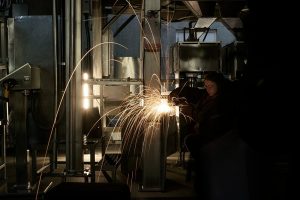
A Still from “Holler”
But your question about Gus. Growing up in that – that was my hometown – and growing up there around a lot of guys who live and work in that town, specifically in those scrapyards and factories, I think there’s a bravado and cockiness and a certain kind of masculinity in those guys, in those towns. And I wanted Blaze to have that and feel like a manly, big brother, but with empathy, and a sensitivity to him, that you do not really see that often in Midwest guys. They’re shown as being these sort of beer-chugging, truck-driving, good old boys. And you don’t see them be that but also have a sensitivity to them, and an empathy, and heart.
And Gus, he comes from the New York theater world and he has a beautiful singing voice and he plays guitar; and I think piano, too. And he’s so not a Blaze, but all of that forms a different kind of Midwest guy. And I think that that’s the direction I wanted to go with it. And Gus also physically transformed for it. He cut off all of his hair for this. There are photos I have of him that are before and after, and he looks like a completely different person.
HtN: Speaking of the sparks, as you just did, I really think your cinematography is quite beautiful, particularly in those scenes where Jessica is working the tool and we’ve got the camera on one side, with sparks in the foreground. You shot on Super 16. What motivated your choice to shoot in Super 16 versus a digital format?
NR: I mean, I love film. I love celluloid. I don’t feel like I could achieve what’s in my head and how the film looks if it’s not on film. But for the Super 16 versus, like, 35mm, for this particular film, it’s a film about a place and people who feel left behind. And so 16mm is kind of left behind and not a lot of people work on it now. And I think it matches that messaging and its aesthetic, a feeling like a film that’s kind of like a small left-behind thing.
HtN: It looks great. And you really get a lot of great detail in the shadows, particularly in a dark scene, like what Jessica was describing with the sparks.
JB: (laughs) But you don’t get a lot of takes.
NR: That is a downside to it. And I would have been worried about it, but I wasn’t worried about it on this film because I had actors who are so, so good at improvising, who so knew these characters, and Jessica always showed up with a handful of ideas. And that’s all I need from an actor. I need them to show up with a handful of ideas. And she always does that. So I was never worried about these actors with film.
HtN: Speaking of your skills. Jessica, English actors are known for always being such wonderful chameleons as far as accents go. How did you work on the specificity of this particular accent? Because it’s not like the generic, mid-Atlantic accent that people often adopt when they’re doing American accents. Here, you have a very specific accent that fits right in. How did you work on that?
JB: I mean, I honestly had no idea that this was the accent of Ohio, shamefully. It was a combination of Nicole and the casting directors. Apart from the people that you can recognize in the movie, the main five of those, everybody else was actually from the area. Nicole and the casting directors were going out to the restaurants that were there, the hotel that we stayed in … people were cast from there. So I was sent their casting tapes to show me what the people sound like. And I was like, “Oh wow.” Because to me it sounded slightly southern, which I’m sure is just not what people from Ohio want to hear. But as a completely ignorant English person, that’s what some of the sounds sounded like. But I knew that it wasn’t.
So I needed to kind of work on not being like, “Oh, this is like an accent from this place.” So we sent those tapes to Wendy Overly, who’s a dialect coach that I worked with on another movie called Jungleland, where I did a similarly specific accent that I’d never heard before. It was an Indiana accent for that movie. And I worked with her, and so did Gus and Austin. And she found a way of … she really had to interpret the sounds to us in a way that we could all understand, and we all had completely different accents to begin with, and she was amazing. I did a lot of work with her and she just had to break down what the sounds were.
I remember she gave me like a shape in my head that I had to think about when I was making certain sounds, where it’s like just a straight line and then some of the sounds have like a curve at the end of them. But I just had to work really hard to never let it be too southern sounding, because that would be wrong. It was hard, but then when we got there, we were surrounded by people who had the accent. We stayed in a local hotel at the time that was so tiny. Everybody was so nice to us. It was one of the most welcoming places that I’ve worked. We had many conversations with locals. Everybody in town knew we were making this movie. That continued to make it so that I could understand the accent better.
HtN: Nicole, you have a lot of very impressive people as Executive Producers, whether it’s Paul Feig, Jessie Henderson, Gretchen McGowan. How did you get this project to be taken under the wing of so many people? What was the process like of getting it to them?
NR: Well, it was a five-year process. This started in, I think, oh gosh, I forget the year now, but it was a five-year process. And a lot of those people were on board before a lot of the other producers and financiers, and it was really Jessica Barden and I for a long time as elements came and went on the film. Paul was really involved, like, very involved. And also Abigail Disney and her company. But I had reached a point on the film where I didn’t feel I was getting support with this film in Hollywood. It was a woman director, first-time director, shooting on film, on location, in a story about a working-class young woman. And I mean, people were not like, “Please get me that story of the working-class young woman. I can’t wait to make that movie in Hollywood!” People were not beating down my door for that.
And the climate for women directors was not what it is today. Things were very different five years ago, except for Paul Feig, who has devoted much of his career to helping women directors. And through an acquaintance, I met Paul, had a meeting with him and Jessie Henderson, and I pitched the film to them. And I mean, I told them every detail – I told them how we were going to load the film! – because I had spent years getting rejected. And so I knew every detail of how to make this film. And Paul said, “Yes,” in the room after so many people said “No” for years. And then Paul and I proceeded to knock on doors for more resources we needed to make the movie. And then, one by one, people started joining in and helping us.
HtN: I’m so glad that you persevered and that you made the film. I really enjoyed it. Thanks to you both for talking to me and for all your work on the movie.
NR/JB: Thank you!
– Christopher Llewellyn Reed (@ChrisReedFilm)








